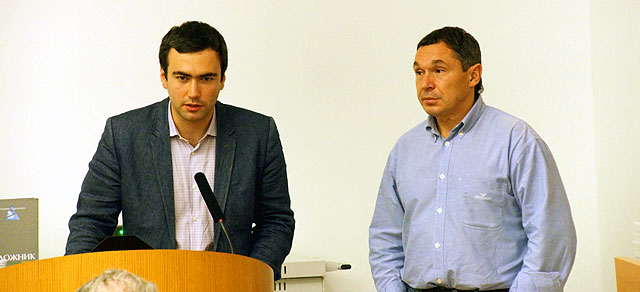On October 2, former political prisoner Vladimir Pereverzin presented his book entitled Hostage: The Story of a Yukos Manager at the Brooklyn Public Library in New York. The event was organized with the support of the Institute of Modern Russia.

Vladimir Pereverzin (right) and Pavel Khodorkovsky
In 2004, Vladimir Pereverzin, who had worked at Yukos Oil Company between 2000 and 2002, was arrested and, later, sentenced to eleven years of imprisonment in a strict regime penal colony. Due to a number of legislative amendments introduced during his time in prison, his sentence was reduced to seven years and two months. Investigators claimed that Pereverzin, acting as part of an organized group, had embezzled oil extracted by Yukos since the beginning of its operations.
Speaking about his book, which is based on diary entries and notes he kept while in prison, Pereverzin shared part of his “story,” the story of what he has had to go through since his arrest on December 16, 2004. According to the author, that day “split [his] life into two parts: the life ‘before’ and the life ‘after.’” The former “ordinary employee” and “mid-level manager” was accused of a crime that he had never committed and could not have committed. Pereverzin is often called “the most randomly chosen prisoner in the Yukos case”; in his opinion, anyone working for the company could have ended up in his place.
It was hope that helped him survive behind bars. At first, he hoped that the “investigation would sort everything out” and that the court would find him not guilty. Then he hoped that the prison police would “treat him in a good way” after reading the case against him, which was based on evidence that did not hold water. According to Pereverzin, however, things turned out just the opposite. Investigators manipulated the evidence to claim that Pereverzin had violated the law (mostly, the evidence just supported the fact that he worked for Yukos). Despite the absurdity of the situation, Judge Elena Yarlykova gave him one of the harshest sentences in the Yukos case. From more than a few people with epaulettes on their shoulders, hungry for promotion and for “earning” new ranks and decorations, Pereverzin was the victim of blatant falsifications, provocations, and scoundrelism.
Vladimir Pereverzin had the opportunity to avoid or reduce his prison time—all he had to do was admit he was guilty and testify against the Yukos higher-ups. He chose not to do so.
Pereverzin believes that in prison, “lie and hypocrisy elevated to the level of state policy acquire an unprecedented form.” Life in prison, according to him, is “a micro-model of social life. Plus, in prison, all processes reach an excessive and distorted level.” It is difficult (if not impossible) to talk about any kind of correctional influence that detention might have on prisoners: approximately 80 percent of those who are released get imprisoned again. In Pereverzin’s estimation, some 20-30 percent of Russian prisoners are unlawfully charged, while 40-50 percent of prisoners’ cases have been wrongly categorized.
Vladimir Pereverzin had the opportunity to avoid or reduce his prison time—all he had to do was admit he was guilty and testify against the Yukos higher-ups. He chose not to do so. He says that, to the investigators’ disappointment, the planned performance—“Yukos employees repent and blame the company’s leaders”—did not unfold; nobody testified falsely.
At the end of Pereverzin’s presentation, IMR President Pavel Khodorkovsky expressed his personal gratitude to the author. In Khodorkovsky’s words, the presentation and book opened a door to a part of his own father’s life with which he had been previously quite unfamiliar (Pavel Khodorkovsky’s father is the currently imprisoned former Yukos CEO Mikhail Khodorkovsky). He also read a short excerpt from Pereverzin’s book:
In places of detention, one is always waiting for something. Waiting for not only a discharge, but rather something more immediate and real, something to which one can reach. Waiting for a parcel or a package, a forthcoming meeting. One’s life is made up of smaller segments, which in their combination equal to an unbelievably lengthy period of imprisonment. These segments, however, bring one closer to the date of discharge and help [one] to survive the time of imprisonment, as if one chips [time] off piece by piece from it.
At the end of his closing speech, Khodorkovsky said to Pereverzin, “We are very pleased that after you stood through the unfair test, you were able to make out of those segments the time that, fortunately, was left behind. Now you are with us and you can share the story of what has been going on in our country.”

